Reflective Report: Analysis of Challenges in MNCs - MGMT 301
VerifiedAdded on 2023/01/12
|7
|1555
|49
Report
AI Summary
This reflective report analyzes the challenges faced by a US-based Hydro Generation (HG) Company operating in Tanzania. The report is based on a case study involving a managerial dilemma concerning a company project in Tanzania. The author reflects on two tasks. Task 1 focuses on the chosen podcast topic of challenges in multinational companies, identifying operational issues, and applying theories such as Hofstede's cultural dimensions to understand cultural differences between the US and Tanzania. Task 2 reflects on group performance using Gibbs' reflective cycle, discussing the application of Belbin's team roles, leadership styles, and the Thomas-Kilmann conflict model to resolve conflicts and improve team dynamics. The report concludes with a summary of the key findings and recommendations for future case studies, highlighting the importance of cultural understanding, effective leadership, and conflict resolution in multinational operations.
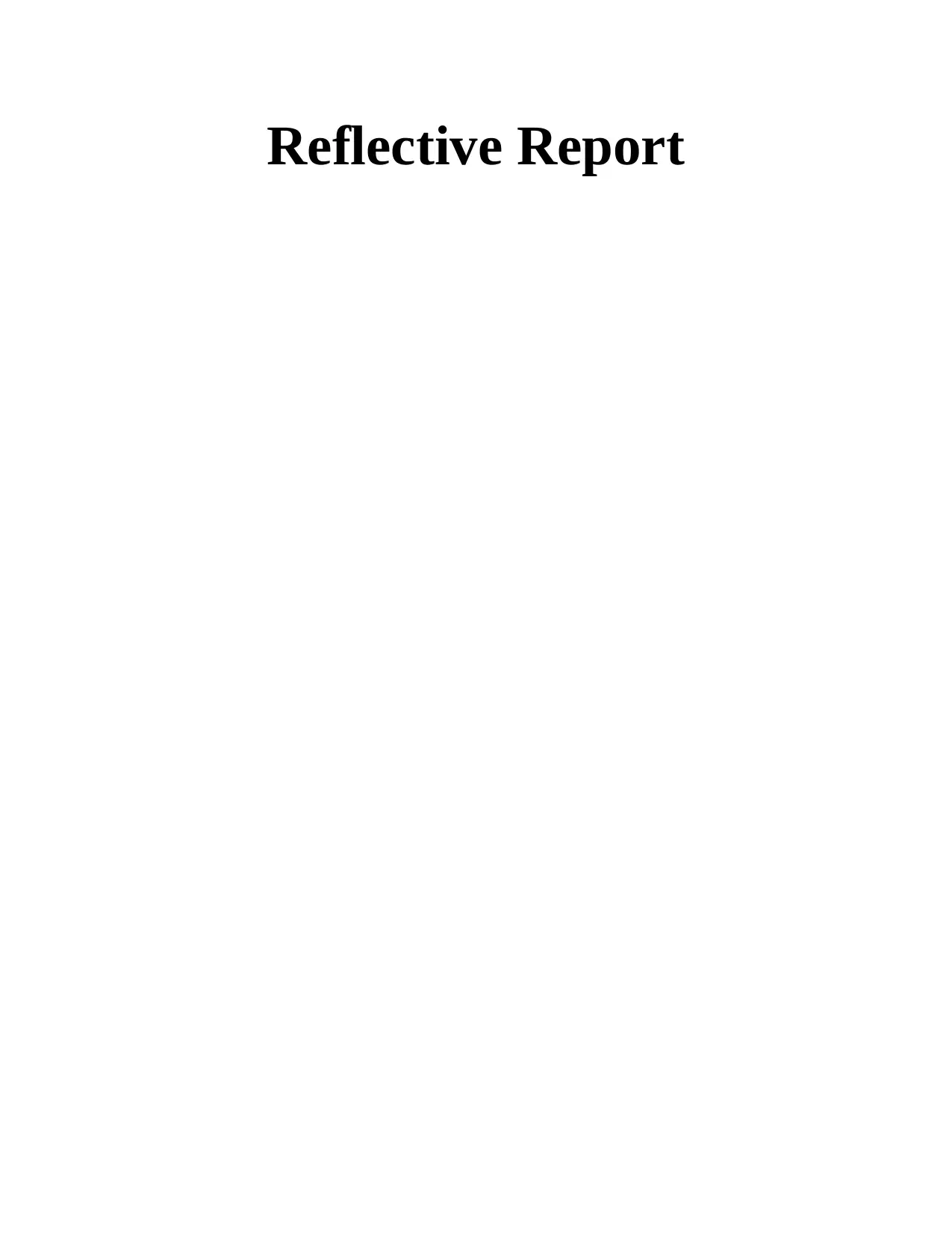
Reflective Report
Paraphrase This Document
Need a fresh take? Get an instant paraphrase of this document with our AI Paraphraser
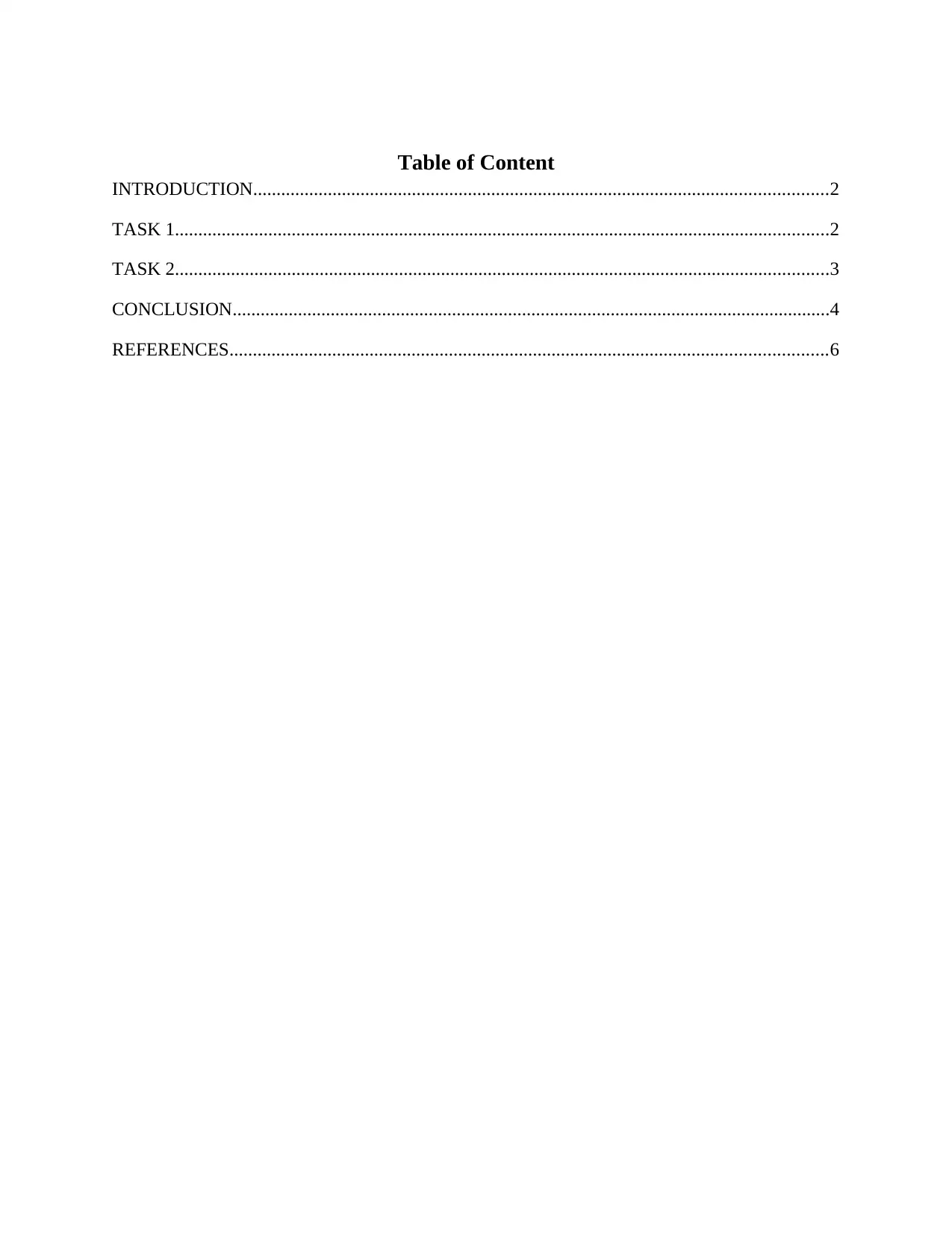
Table of Content
INTRODUCTION...........................................................................................................................2
TASK 1............................................................................................................................................2
TASK 2............................................................................................................................................3
CONCLUSION................................................................................................................................4
REFERENCES................................................................................................................................6
INTRODUCTION...........................................................................................................................2
TASK 1............................................................................................................................................2
TASK 2............................................................................................................................................3
CONCLUSION................................................................................................................................4
REFERENCES................................................................................................................................6
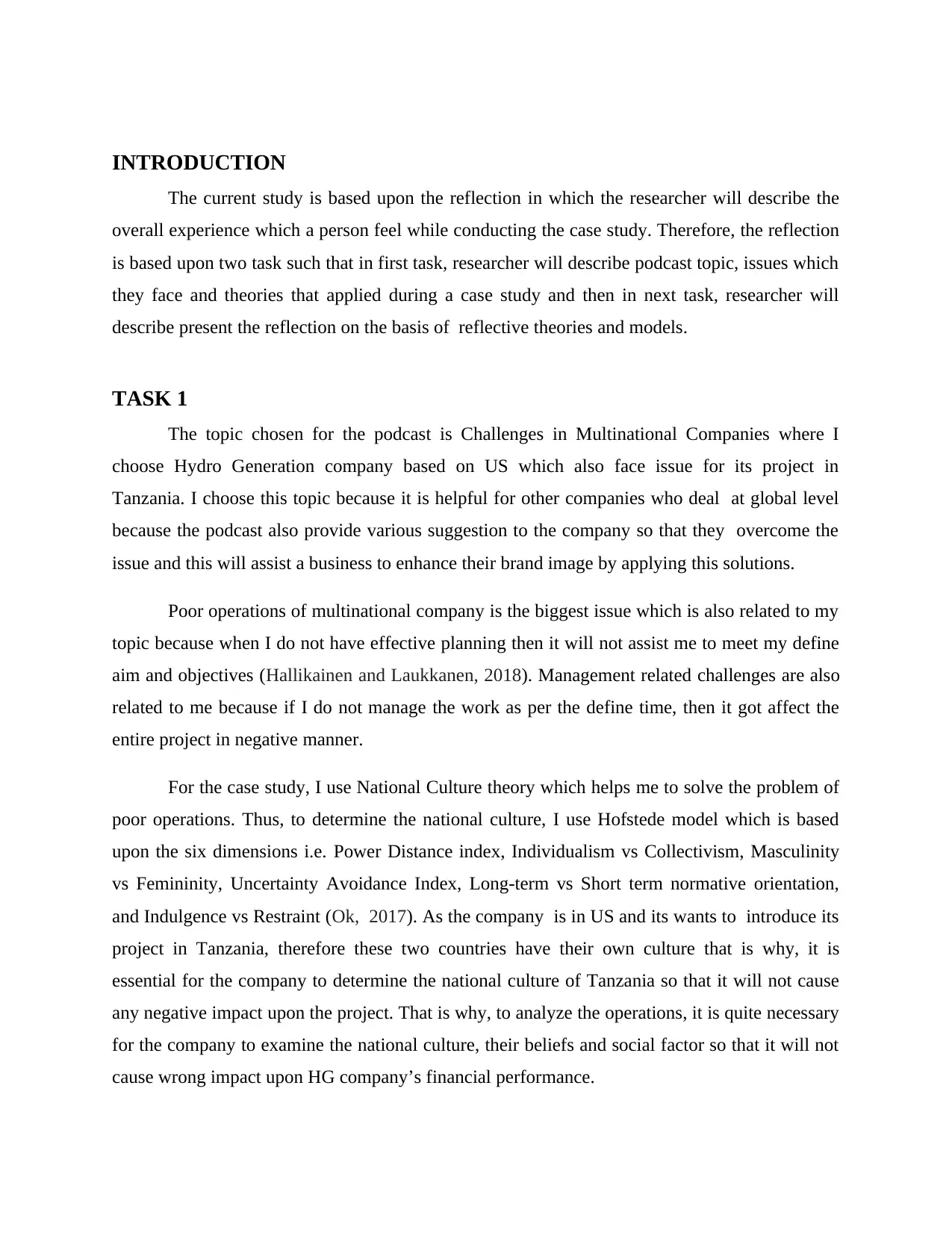
INTRODUCTION
The current study is based upon the reflection in which the researcher will describe the
overall experience which a person feel while conducting the case study. Therefore, the reflection
is based upon two task such that in first task, researcher will describe podcast topic, issues which
they face and theories that applied during a case study and then in next task, researcher will
describe present the reflection on the basis of reflective theories and models.
TASK 1
The topic chosen for the podcast is Challenges in Multinational Companies where I
choose Hydro Generation company based on US which also face issue for its project in
Tanzania. I choose this topic because it is helpful for other companies who deal at global level
because the podcast also provide various suggestion to the company so that they overcome the
issue and this will assist a business to enhance their brand image by applying this solutions.
Poor operations of multinational company is the biggest issue which is also related to my
topic because when I do not have effective planning then it will not assist me to meet my define
aim and objectives (Hallikainen and Laukkanen, 2018). Management related challenges are also
related to me because if I do not manage the work as per the define time, then it got affect the
entire project in negative manner.
For the case study, I use National Culture theory which helps me to solve the problem of
poor operations. Thus, to determine the national culture, I use Hofstede model which is based
upon the six dimensions i.e. Power Distance index, Individualism vs Collectivism, Masculinity
vs Femininity, Uncertainty Avoidance Index, Long-term vs Short term normative orientation,
and Indulgence vs Restraint (Ok, 2017). As the company is in US and its wants to introduce its
project in Tanzania, therefore these two countries have their own culture that is why, it is
essential for the company to determine the national culture of Tanzania so that it will not cause
any negative impact upon the project. That is why, to analyze the operations, it is quite necessary
for the company to examine the national culture, their beliefs and social factor so that it will not
cause wrong impact upon HG company’s financial performance.
The current study is based upon the reflection in which the researcher will describe the
overall experience which a person feel while conducting the case study. Therefore, the reflection
is based upon two task such that in first task, researcher will describe podcast topic, issues which
they face and theories that applied during a case study and then in next task, researcher will
describe present the reflection on the basis of reflective theories and models.
TASK 1
The topic chosen for the podcast is Challenges in Multinational Companies where I
choose Hydro Generation company based on US which also face issue for its project in
Tanzania. I choose this topic because it is helpful for other companies who deal at global level
because the podcast also provide various suggestion to the company so that they overcome the
issue and this will assist a business to enhance their brand image by applying this solutions.
Poor operations of multinational company is the biggest issue which is also related to my
topic because when I do not have effective planning then it will not assist me to meet my define
aim and objectives (Hallikainen and Laukkanen, 2018). Management related challenges are also
related to me because if I do not manage the work as per the define time, then it got affect the
entire project in negative manner.
For the case study, I use National Culture theory which helps me to solve the problem of
poor operations. Thus, to determine the national culture, I use Hofstede model which is based
upon the six dimensions i.e. Power Distance index, Individualism vs Collectivism, Masculinity
vs Femininity, Uncertainty Avoidance Index, Long-term vs Short term normative orientation,
and Indulgence vs Restraint (Ok, 2017). As the company is in US and its wants to introduce its
project in Tanzania, therefore these two countries have their own culture that is why, it is
essential for the company to determine the national culture of Tanzania so that it will not cause
any negative impact upon the project. That is why, to analyze the operations, it is quite necessary
for the company to examine the national culture, their beliefs and social factor so that it will not
cause wrong impact upon HG company’s financial performance.
⊘ This is a preview!⊘
Do you want full access?
Subscribe today to unlock all pages.

Trusted by 1+ million students worldwide
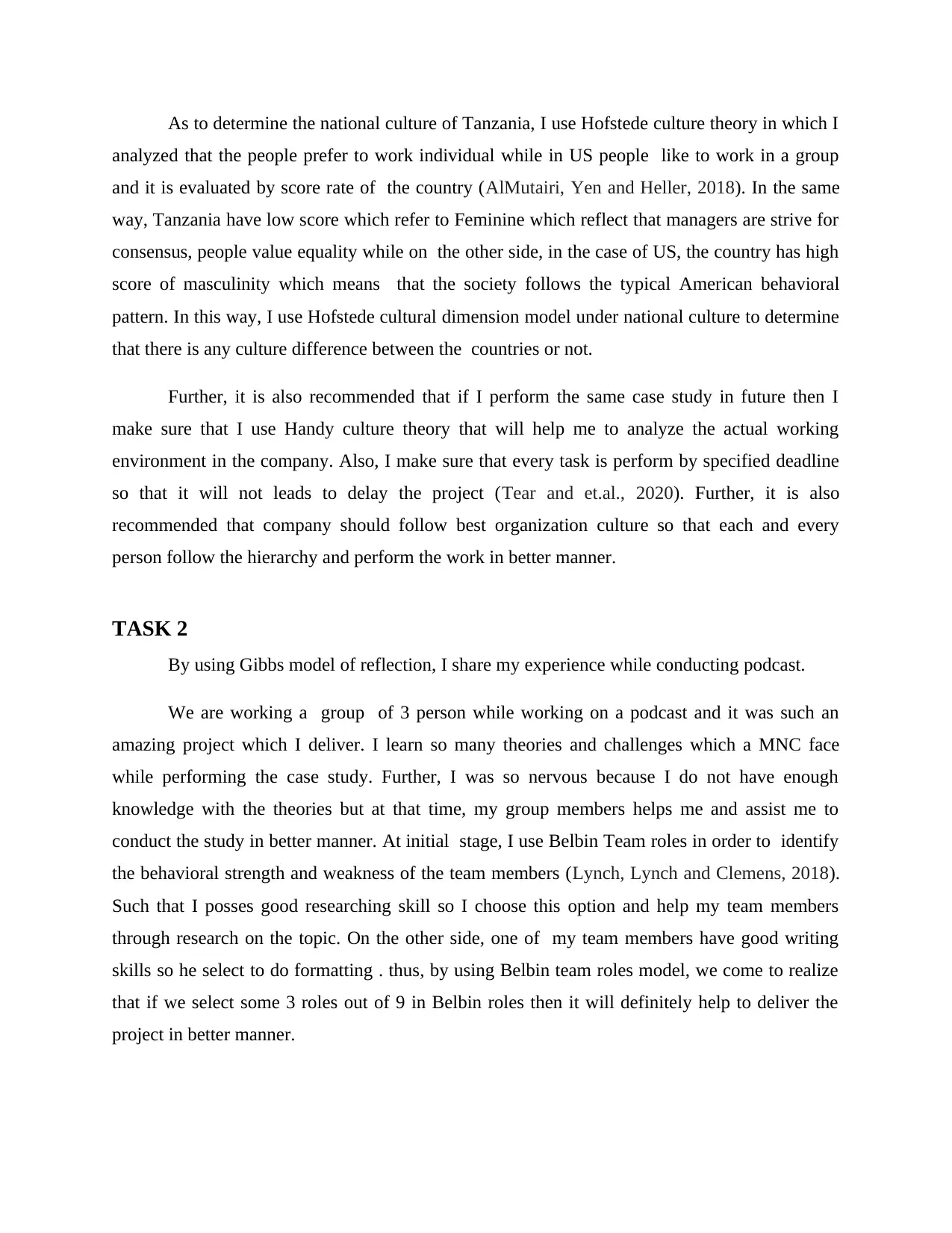
As to determine the national culture of Tanzania, I use Hofstede culture theory in which I
analyzed that the people prefer to work individual while in US people like to work in a group
and it is evaluated by score rate of the country (AlMutairi, Yen and Heller, 2018). In the same
way, Tanzania have low score which refer to Feminine which reflect that managers are strive for
consensus, people value equality while on the other side, in the case of US, the country has high
score of masculinity which means that the society follows the typical American behavioral
pattern. In this way, I use Hofstede cultural dimension model under national culture to determine
that there is any culture difference between the countries or not.
Further, it is also recommended that if I perform the same case study in future then I
make sure that I use Handy culture theory that will help me to analyze the actual working
environment in the company. Also, I make sure that every task is perform by specified deadline
so that it will not leads to delay the project (Tear and et.al., 2020). Further, it is also
recommended that company should follow best organization culture so that each and every
person follow the hierarchy and perform the work in better manner.
TASK 2
By using Gibbs model of reflection, I share my experience while conducting podcast.
We are working a group of 3 person while working on a podcast and it was such an
amazing project which I deliver. I learn so many theories and challenges which a MNC face
while performing the case study. Further, I was so nervous because I do not have enough
knowledge with the theories but at that time, my group members helps me and assist me to
conduct the study in better manner. At initial stage, I use Belbin Team roles in order to identify
the behavioral strength and weakness of the team members (Lynch, Lynch and Clemens, 2018).
Such that I posses good researching skill so I choose this option and help my team members
through research on the topic. On the other side, one of my team members have good writing
skills so he select to do formatting . thus, by using Belbin team roles model, we come to realize
that if we select some 3 roles out of 9 in Belbin roles then it will definitely help to deliver the
project in better manner.
analyzed that the people prefer to work individual while in US people like to work in a group
and it is evaluated by score rate of the country (AlMutairi, Yen and Heller, 2018). In the same
way, Tanzania have low score which refer to Feminine which reflect that managers are strive for
consensus, people value equality while on the other side, in the case of US, the country has high
score of masculinity which means that the society follows the typical American behavioral
pattern. In this way, I use Hofstede cultural dimension model under national culture to determine
that there is any culture difference between the countries or not.
Further, it is also recommended that if I perform the same case study in future then I
make sure that I use Handy culture theory that will help me to analyze the actual working
environment in the company. Also, I make sure that every task is perform by specified deadline
so that it will not leads to delay the project (Tear and et.al., 2020). Further, it is also
recommended that company should follow best organization culture so that each and every
person follow the hierarchy and perform the work in better manner.
TASK 2
By using Gibbs model of reflection, I share my experience while conducting podcast.
We are working a group of 3 person while working on a podcast and it was such an
amazing project which I deliver. I learn so many theories and challenges which a MNC face
while performing the case study. Further, I was so nervous because I do not have enough
knowledge with the theories but at that time, my group members helps me and assist me to
conduct the study in better manner. At initial stage, I use Belbin Team roles in order to identify
the behavioral strength and weakness of the team members (Lynch, Lynch and Clemens, 2018).
Such that I posses good researching skill so I choose this option and help my team members
through research on the topic. On the other side, one of my team members have good writing
skills so he select to do formatting . thus, by using Belbin team roles model, we come to realize
that if we select some 3 roles out of 9 in Belbin roles then it will definitely help to deliver the
project in better manner.
Paraphrase This Document
Need a fresh take? Get an instant paraphrase of this document with our AI Paraphraser
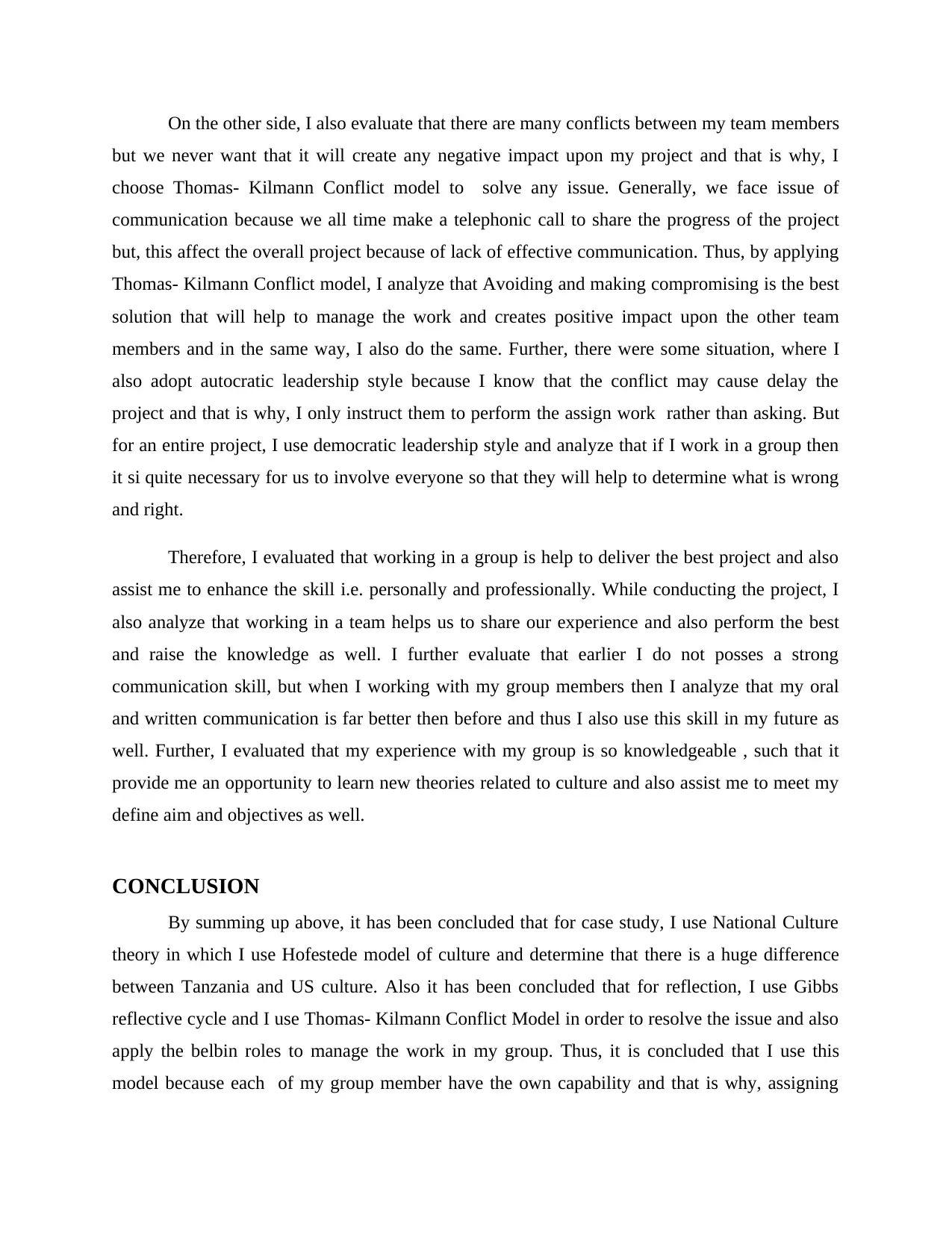
On the other side, I also evaluate that there are many conflicts between my team members
but we never want that it will create any negative impact upon my project and that is why, I
choose Thomas- Kilmann Conflict model to solve any issue. Generally, we face issue of
communication because we all time make a telephonic call to share the progress of the project
but, this affect the overall project because of lack of effective communication. Thus, by applying
Thomas- Kilmann Conflict model, I analyze that Avoiding and making compromising is the best
solution that will help to manage the work and creates positive impact upon the other team
members and in the same way, I also do the same. Further, there were some situation, where I
also adopt autocratic leadership style because I know that the conflict may cause delay the
project and that is why, I only instruct them to perform the assign work rather than asking. But
for an entire project, I use democratic leadership style and analyze that if I work in a group then
it si quite necessary for us to involve everyone so that they will help to determine what is wrong
and right.
Therefore, I evaluated that working in a group is help to deliver the best project and also
assist me to enhance the skill i.e. personally and professionally. While conducting the project, I
also analyze that working in a team helps us to share our experience and also perform the best
and raise the knowledge as well. I further evaluate that earlier I do not posses a strong
communication skill, but when I working with my group members then I analyze that my oral
and written communication is far better then before and thus I also use this skill in my future as
well. Further, I evaluated that my experience with my group is so knowledgeable , such that it
provide me an opportunity to learn new theories related to culture and also assist me to meet my
define aim and objectives as well.
CONCLUSION
By summing up above, it has been concluded that for case study, I use National Culture
theory in which I use Hofestede model of culture and determine that there is a huge difference
between Tanzania and US culture. Also it has been concluded that for reflection, I use Gibbs
reflective cycle and I use Thomas- Kilmann Conflict Model in order to resolve the issue and also
apply the belbin roles to manage the work in my group. Thus, it is concluded that I use this
model because each of my group member have the own capability and that is why, assigning
but we never want that it will create any negative impact upon my project and that is why, I
choose Thomas- Kilmann Conflict model to solve any issue. Generally, we face issue of
communication because we all time make a telephonic call to share the progress of the project
but, this affect the overall project because of lack of effective communication. Thus, by applying
Thomas- Kilmann Conflict model, I analyze that Avoiding and making compromising is the best
solution that will help to manage the work and creates positive impact upon the other team
members and in the same way, I also do the same. Further, there were some situation, where I
also adopt autocratic leadership style because I know that the conflict may cause delay the
project and that is why, I only instruct them to perform the assign work rather than asking. But
for an entire project, I use democratic leadership style and analyze that if I work in a group then
it si quite necessary for us to involve everyone so that they will help to determine what is wrong
and right.
Therefore, I evaluated that working in a group is help to deliver the best project and also
assist me to enhance the skill i.e. personally and professionally. While conducting the project, I
also analyze that working in a team helps us to share our experience and also perform the best
and raise the knowledge as well. I further evaluate that earlier I do not posses a strong
communication skill, but when I working with my group members then I analyze that my oral
and written communication is far better then before and thus I also use this skill in my future as
well. Further, I evaluated that my experience with my group is so knowledgeable , such that it
provide me an opportunity to learn new theories related to culture and also assist me to meet my
define aim and objectives as well.
CONCLUSION
By summing up above, it has been concluded that for case study, I use National Culture
theory in which I use Hofestede model of culture and determine that there is a huge difference
between Tanzania and US culture. Also it has been concluded that for reflection, I use Gibbs
reflective cycle and I use Thomas- Kilmann Conflict Model in order to resolve the issue and also
apply the belbin roles to manage the work in my group. Thus, it is concluded that I use this
model because each of my group member have the own capability and that is why, assigning
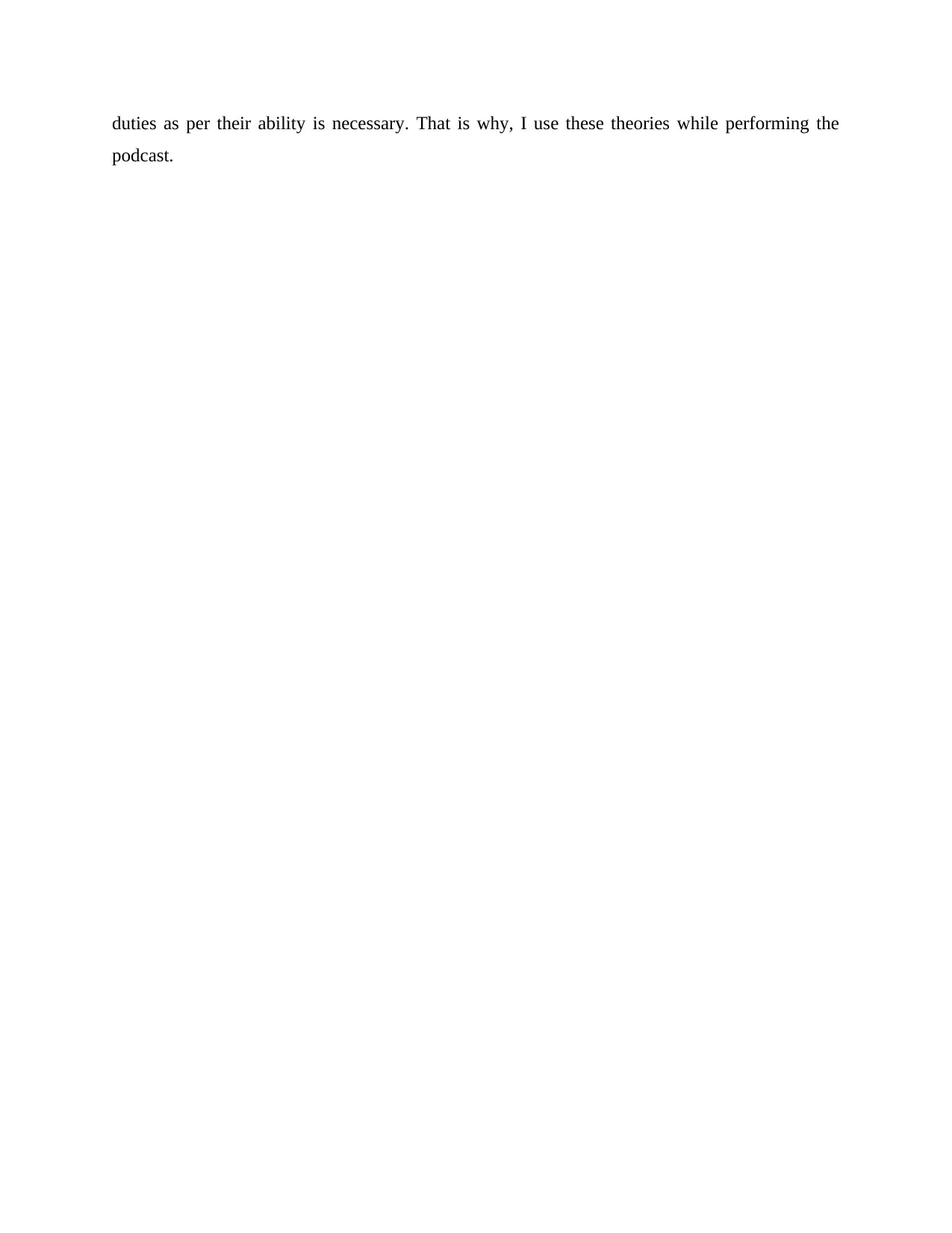
duties as per their ability is necessary. That is why, I use these theories while performing the
podcast.
podcast.
⊘ This is a preview!⊘
Do you want full access?
Subscribe today to unlock all pages.

Trusted by 1+ million students worldwide
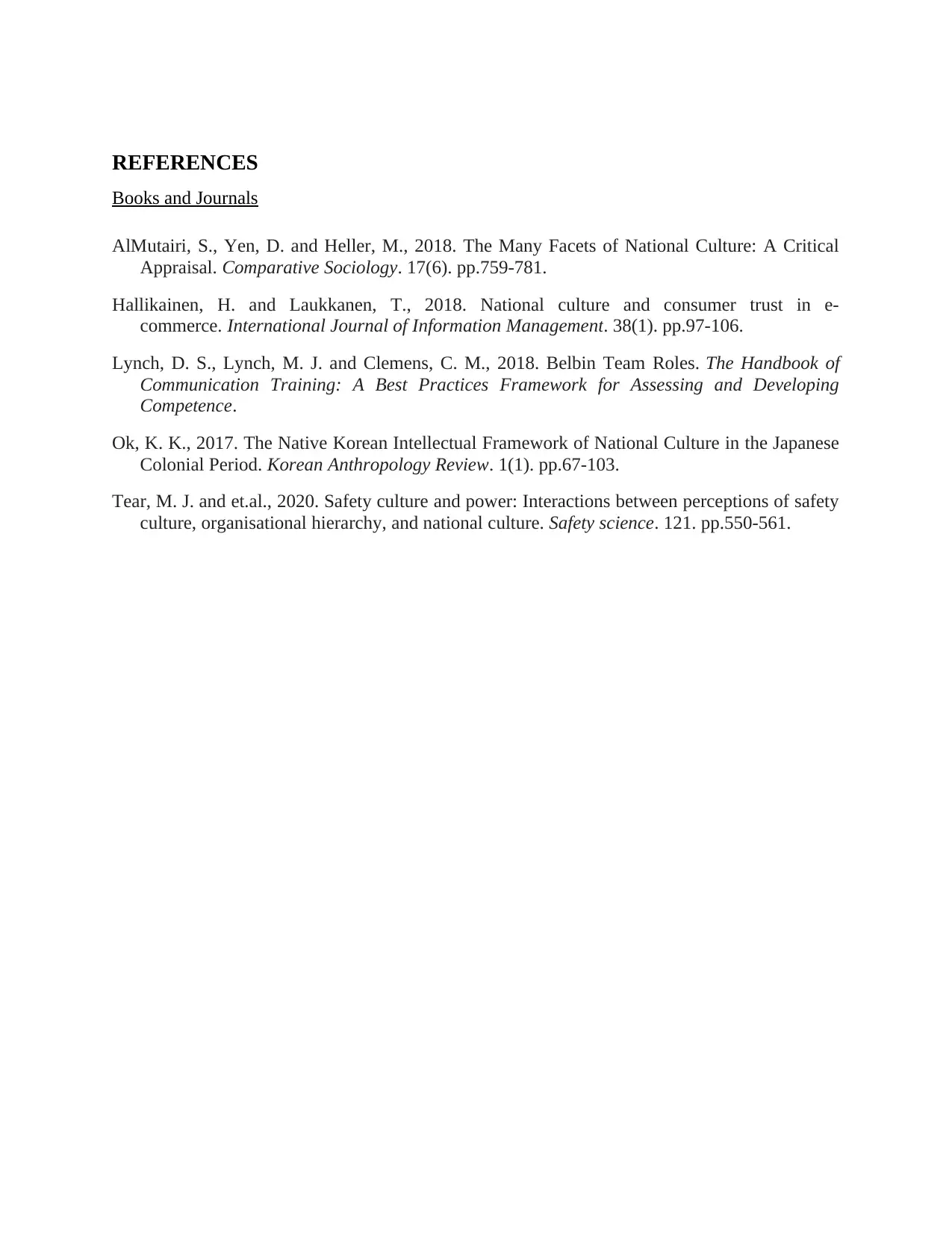
REFERENCES
Books and Journals
AlMutairi, S., Yen, D. and Heller, M., 2018. The Many Facets of National Culture: A Critical
Appraisal. Comparative Sociology. 17(6). pp.759-781.
Hallikainen, H. and Laukkanen, T., 2018. National culture and consumer trust in e-
commerce. International Journal of Information Management. 38(1). pp.97-106.
Lynch, D. S., Lynch, M. J. and Clemens, C. M., 2018. Belbin Team Roles. The Handbook of
Communication Training: A Best Practices Framework for Assessing and Developing
Competence.
Ok, K. K., 2017. The Native Korean Intellectual Framework of National Culture in the Japanese
Colonial Period. Korean Anthropology Review. 1(1). pp.67-103.
Tear, M. J. and et.al., 2020. Safety culture and power: Interactions between perceptions of safety
culture, organisational hierarchy, and national culture. Safety science. 121. pp.550-561.
Books and Journals
AlMutairi, S., Yen, D. and Heller, M., 2018. The Many Facets of National Culture: A Critical
Appraisal. Comparative Sociology. 17(6). pp.759-781.
Hallikainen, H. and Laukkanen, T., 2018. National culture and consumer trust in e-
commerce. International Journal of Information Management. 38(1). pp.97-106.
Lynch, D. S., Lynch, M. J. and Clemens, C. M., 2018. Belbin Team Roles. The Handbook of
Communication Training: A Best Practices Framework for Assessing and Developing
Competence.
Ok, K. K., 2017. The Native Korean Intellectual Framework of National Culture in the Japanese
Colonial Period. Korean Anthropology Review. 1(1). pp.67-103.
Tear, M. J. and et.al., 2020. Safety culture and power: Interactions between perceptions of safety
culture, organisational hierarchy, and national culture. Safety science. 121. pp.550-561.
1 out of 7
Related Documents
Your All-in-One AI-Powered Toolkit for Academic Success.
+13062052269
info@desklib.com
Available 24*7 on WhatsApp / Email
![[object Object]](/_next/static/media/star-bottom.7253800d.svg)
Unlock your academic potential
Copyright © 2020–2026 A2Z Services. All Rights Reserved. Developed and managed by ZUCOL.




